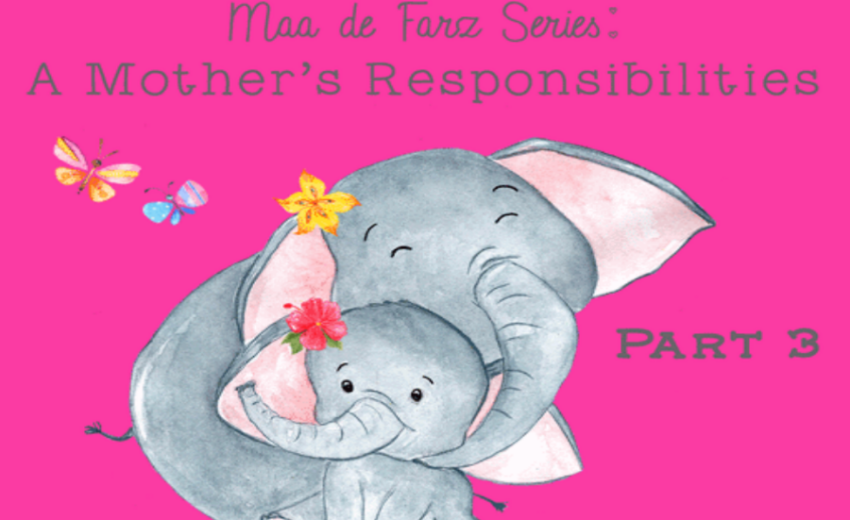Read
Maa De Farz Part I
Maa De Farz Part 2
Jun 22, 2018: This is the third part of Maa De Farz by Bhai Guriqbal Singh Ji, but it’s the second Farz (duty/responsibility). The first farz happens before a woman is even pregnant. For the second farz, a child is now in her womb. A mother’s second farz is that she should hold on tightly to Naam while pregnant. In this katha, Bhai Guriqbal Singh Jee informs us of an ardaas potential mothers should do and a special Jaap (recitation/meditation) to do when pregnant. Moreover, Bhai Ji gives two historical examples of how a mother’s Connection while pregnant positively influences her child-to-be.
Ardaas to do when Pregnant
Giani Pinderpal Singh Ji wrote that once the child has acquired a home in the womb (a woman is pregnant), then the mom-to-be should do the following ardaas:
“Guru Gobind Singh Jee, my womb has been blessed. Please, send me a soul that will be immersed in your Bhagti (your devotional remembrance).”
Vaheguroo-Vaheguroo Jap while Pregnant
Additionally, a Mahapursh did Bachan (spoke the Truth) and illuminated that if the pregnant woman stops all of her thoughts, she should be able to hear or sense her unborn child’s heartbeat. If she does Waheguru-Vaheguru Jaap (recitation) along with her baby-to-be’s heartbeat for half an hour a day, twice a day, her baby will begin to acquire good conduct and character within the womb. Engaging in this practice will guarantee that the mother will give birth to someone who is on the path of Bhagti (devotion).
Bhagat Prahlad Ji
Then, Bhai Guriqbal Singh Jee gives the example of Bhagat Prahlaad Ji to demonstrate how life-changing Naam can be for the baby, when the baby is still in his mother’s womb. Bhagat Prahlaad Ji’s father is Harnaakash Dusht (literally, an evil person).
A little background: Harnaakash’s brother had died. This caused Harnaakash to seek a blessing that in which he thought he could avoid death: “May I not die inside or outside. In the daytime or night time. In the air or on the ground. By a human or an animal.” He did austere penance (Tapasya) and to obtain this blessing. When Harnaakash had left his Kingdom for Tapasya, Inder Devta (King of Gods) had forcibly taken over Harnaakash’s reign.
Prahlaad Ji was in the womb of His mother, Kiyaadu, when His father’s empire was taken over. At that time, Inder Devta turned Harnaakash’s wife over to Naarad Muni, Brahma’s Son. Naarad Muni took her in his Ashram (holy place for meditating) as his daughter (just to make it super clear: he wasn’t actually her father, but accepted her like a father would give shelter to his daughter). Naarad Muni knowing full well that his daughter was pregnant, ensured that Kiyaadu, listened to:
Hari de Bhajan (God’s Praises)
Sat da Updesh (Learning about Ultimate Truth aka Katha)
Bhagta Deeyan Sakhiya (True Stories of Bhagat’s Lives)
So THAT’S where Prahlaad got His good character and high principles from – they were formed while He was in-utero! In other words, while He was in the womb, Prahlaad received SatSangat: He was LITERALLY formed with Hari de Bhajan, Sat da Updesh, and Bhagta deeyan Sakhiya. That’s how a Bhagat was born in the house of a Demon. In fact, in one of Bhai Gurdas Jee’s Vaar about Bhagat Jee, Bhai Gurdas Jee says:
ਘਰਿ ਹਰਣਾਖਸ ਦੈਤ ਦੇ ਕਲਰਿ ਕਵਲੁ ਭਗਤੁ ਪ੍ਰਹਿਲਾਦੁ[
ghar haranaakhas dhait dhe kalar kaval bhagat prahilaadhu|
Prahlad, the saint, was born in the house of demon (king) Haranakhas like a lotus is born in the alkaline (barren) land.
(Bhai Gurdas Ji’s Vaar, Panna 10)
Basically, Bhagat Prahlaad Ji was born in a total barren land, a house devoid of Bhagti (the remembrance of God). However, from His time in the womb, He acquired such virtuous traits that we still remember Him daily in Rehraas Sahib!:
ਹਰਿ ਜੁਗੁ ਜੁਗੁ ਭਗਤ ਉਪਾਇਓਾ ਪੈਜ ਰਖਦਾ ਓਾਇਓਾ ਰਾਮ ਰਾਜੇ ]
har jug jug bhagat aupaiaa paij rakhadhaa aaiaa raam raaje ||
In each and every age, He creates His devotees and preserves their honor, O Lord King.ਹਰਣਾਖਸੁ ਦੁਸਟੁ ਹਰਿ ਮਾਰਿਓਾ ਪ੍ਰਹਲਾਦੁ ਤਰਾਇਓਾ ]
haranaakhas dhusaT har maariaa prahalaadh taraiaa ||The Lord killed the wicked Harnaakhash, and saved Prahlaad.
(Raag Aasa, Mehla 4, Ang 451)
Therefore, when the child is in-utero, the mother should be enjoined to Sat, the Truth. If mothers-to-be enjoin to Truth, they could give birth to a Bhagat like Prahlaad… And who wouldn’t want that?!
Rai Jodh’s Bibi
Bhai Guriqbal Singh Jee then shares another example of Rai Jodh’s wife. Rai Jodh’s wife came from a Gursikh family, she herself was a Gursikh, but unfortunately, the family she married into was NOT into Sikhi. Every day, she would cry and wonder, “Where have I come?” as it’s quite difficult to be into Sikhi and married into a family where there isn’t Sikhi.
One day, Guru Hargobind Sahib Jee came to their town in Kangarrh. Bhai Jodh’s Bibi told her husband, “Guru Nanak’s 6th light has come. Will you come with me to get Darshan (witness His Holiness)?”
He said, “I’ll think about it.”
She started to think about how she could get him to come along and then remembers that Sifat-Salaah (praises) of the True One joins people to the Truth. So then she said three potent phrases that convinced her husband to join her:
1. “Guru Hargobind Sahib is the giver of happiness of this world and the next.”
2. “Did you know that Darshan of the Sixth King (Paatshah) obliterates anxieties and worries?!”
3. “Let’s please go and see Him. Let’s go and maybe you can also be blessed with Sikhi.”
Rai Jodh agreed and insisted on not going empty-handed. So, he got together all kinds of material goods and went. However, failed to come to Guru Sahib Jee with Nimrita (Humility).
When Rai Jodh arrived, he ordered that a message be sent to Guru Sahib Jee that “I, Rai Jodh, have arrived.”
Guru Sahib Jee knew of Rai Jodh’s mammoth pride. Therefore, Guru Ji said, “I’ll meet him tomorrow.” In other words, Guru Ji sent the message, “You aren’t as important as you think you are!”
Props to Rai Jodh who accepted with a “Sat Bachan” (true is your Word; also said to show acceptance of Guru’s command). He waited until the following day.
After Rai Jodh’s pride level had leveled off, he got to meet with Guru Sahib Jee. He started talking about weapons and horses with Guru Jee. Rai Jodh’s wife was also present and was doing inner ardaas to make such an event happen so that she would get 2 minutes alone with Guru Jee. She thought, “I want to talk to you openly about what’s in my heart. Please make a way for this to happen.”
Sure enough, Guru Sahib Jee made a way. Guru Sahib’s generals took Rai Jodh aside and continued the conversation about weapons and horses. Rai Jodh’s wife saw that Guru Ji had made a way for them to be alone. She went up to Guru Jee and said, “I’m a Sikh’s Daughter, but there’s no Sikhi in my husband’s house (where I’ve gotten married).”
Quick Tangent: Marry Sikh Daughters into a Sikh Family
Bhai Guriqbal Singh Jee goes on a small tangent and warns that it’s INCREDIBLY difficult for a woman who has been brought up in a Sikh household to marry into a household where there is NO Sikhi. He advises that during the time where a girl’s parents are looking for a suitable match, to avoid looking at the size of the house or the number of cars or how much money the guy earns. Instead, look and see if the potential bride and groom have Sikh principles that match.
Bhai Jee got a call once from a girl’s family to set her up with another Gursikh that Bhai Jee knows. When Bhai Jee heard, he was astonished and said, “But you are living totally different qualities of life! The boy (potential) has only a scooter (no car) and a small dinky house, whereas you have a huge house and four really decent cars.”
The parents acknowledged that they knew that there were differences, but based on the fact the boy had Jaap Sahib Paath memorized, they wanted to pursue this potential partner for their daughter. They said, “Someone who has this much love for Guru Gobind Singh Jee that they’ve memorized Jaap Sahib… Well, then big houses and cars will come by themselves.” In other words, we should also care less about someone’s social status and material wealth when looking for suitable matches. Instead, we should look towards someone’s spiritual lifestyle and if the prospective match are walking on the same spiritual path.
Back to Rai Jodh’s Bibi and Guru Jee
Hearing her plea, Guru Hargobind Sahib Jee raised his hand to bless Rai Jodh’s wife and said, “Remember Satigur, my daughter. Then when the time comes for you to be pregnant, always keep the support of Jap Ji Sahib – don’t ever forsake it! Keep Gurbani and Naam strongly flowing through you. Through the blessings of Jap Ji Sahib, Gurbani, and Naam, your children will be profoundly influenced. I give you my word (Bachan) that through Baani, such great souls will come into your house. Plants of Sikhi will be installed in your house (plants of Sikhi means people’s whose Sikhi will last for generations – because plants give rise to more plants and beautiful flowers!). Furthermore, when I’m in my 10th form, I will accept Seva (selfless service) from two of your great grandsons that spring from these plants of Sikhi.”
Sure enough, when Guru Gobind Singh Jee sent the Zafarnama to Aurengzeb, Guru Gobind Singh Jee stayed at this Bibi’s great grandsons’ home in Kangarrh, and the whole family was blessed with the opportunity to serve Guru Ji.
Recap!
Therefore, the second farz of a mother occurs when the child has acquired a home in the womb (in other words, once the woman finally becomes pregnant):
ਉਦਰੈ ਮਾਹਿ ਓਾਇ ਕੀਓਾ ਨਿਵਾਸੁ ]
Oudharai maeh aai keeaa nivaas ||
He came to acquire a home in the womb,ਮਾਤਾ ਕੈ ਮਨਿ ਬਹੁਤੁ ਬਿਗਾਸੁ ]1]
maataa kai man bahut bigaas ||1||
and his mother’s heart is so very glad. ||1||
(Raag Asa, Mehla 5, Ang 396)
When a woman becomes pregnant, she should continue doing her Naem, and then plants of Sikhi will be born. She will give birth to Gursikhs who have been given a priceless education and the limitless gift from being in a womb saturated in Gurbani. While the baby’s internal organs, blood, bones, and flesh are forming, they will be steeped in Bani. So of course the child will be a Gursikh, a Bhagat, a true devotee of God. And Baani says that the mothers of such beings are themselves, incredibly blessed:
ਓਾਪਿ ਲੀਏ ਲੜਿ ਲਾਇ ਦਰਿ ਦਰਵੇਸ ਸੇ ]
aap le’ee laR lai dhar dharaves se ||
Those whom the Lord attaches to the hem of His robe, are the true dervishes at His Door.ਤਿਨ ਧੰਨੁ ਜਣੇਦੀ ਮਾਉ ਓਾਏ ਸਫਲੁ ਸੇ ]2]
tin dha(n)n janedhee maau aae safal se ||2||
Blessed are the mothers who gave birth to them, and fruitful is their coming into the world. ||2||
(Raag Asa, Bhagat Sheikh Fareed Ji, Ang 488)
Resources





